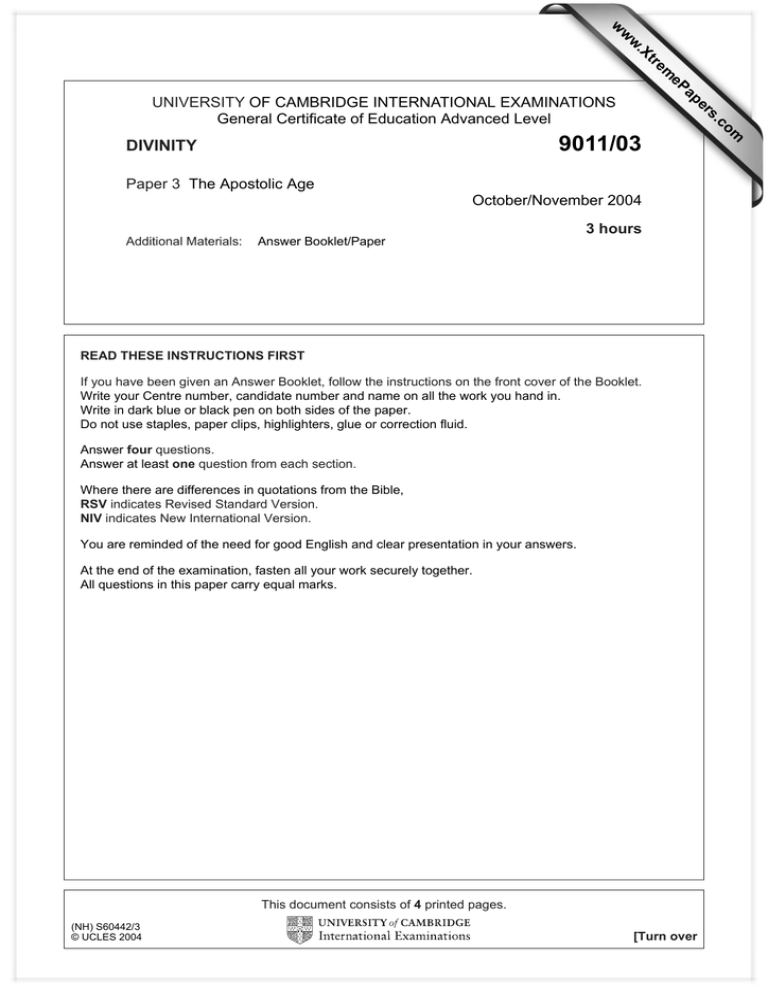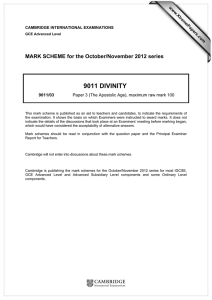
w
w
ap
eP
m
e
tr
.X
w
9011/03
DIVINITY
Paper 3 The Apostolic Age
October/November 2004
3 hours
Additional Materials:
Answer Booklet/Paper
READ THESE INSTRUCTIONS FIRST
If you have been given an Answer Booklet, follow the instructions on the front cover of the Booklet.
Write your Centre number, candidate number and name on all the work you hand in.
Write in dark blue or black pen on both sides of the paper.
Do not use staples, paper clips, highlighters, glue or correction fluid.
Answer four questions.
Answer at least one question from each section.
Where there are differences in quotations from the Bible,
RSV indicates Revised Standard Version.
NIV indicates New International Version.
You are reminded of the need for good English and clear presentation in your answers.
At the end of the examination, fasten all your work securely together.
All questions in this paper carry equal marks.
This document consists of 4 printed pages.
(NH) S60442/3
© UCLES 2004
[Turn over
om
.c
s
er
UNIVERSITY OF CAMBRIDGE INTERNATIONAL EXAMINATIONS
General Certificate of Education Advanced Level
2
Section A
Answer at least one question from this section.
If you choose question 1, answer in one version only.
Colossians and Hebrews
REVISED STANDARD VERSION
1
Comment on points of interest or difficulty in four of the following, with brief reference to the
general context:
(a) These have indeed an appearance of wisdom in promoting rigour of devotion and selfabasement and severity to the body, but they are of no value in checking the indulgence of
the flesh.
(Colossians 2:23)
(b) Aristarchus my fellow prisoner greets you, and Mark the cousin of Barnabas … and Jesus
who is called Justus. These are the only men of the circumcision among my fellow workers
for the kingdom of God, and they have been a comfort to me.
(Colossians 4:10–11)
(c) And again, when he brings the first-born into the world, he says,
“Let all God’s angels worship him.”
Of the angels he says,
“Who makes his angels winds, and his servants flames of fire.”
But of the Son he says,
“Thy throne, O God, is for ever and ever …”
(Hebrews 1:6–8a)
(d) He is without father or mother or genealogy, and has neither beginning of days nor end of life,
but resembling the Son of God he continues a priest for ever.
(Hebrews 7:3)
(e) For Christ has entered, not into a sanctuary made with hands, a copy of the true one, but into
heaven itself, now to appear in the presence of God on our behalf.
(Hebrews 9:24)
(f)
“… but my righteous one shall live by faith,
and if he shrinks back,
my soul has no pleasure in him.”
But we are not of those who shrink back and are destroyed, but of those who have faith and
keep their souls.
(Hebrews 10:38-39)
© UCLES 2004
9011/03 O/N/04
3
NEW INTERNATIONAL VERSION
1
Comment on points of interest or difficulty in four of the following, with brief reference to the
general context:
(a) Such regulations indeed have an appearance of wisdom, with their self-imposed worship,
their false humility and their harsh treatment of the body, but they lack any value in restraining
sensual indulgence.
(Colossians 2:23)
(b) My fellow-prisoner Aristarchus sends you his greetings, as does Mark, the cousin of
Barnabas … Jesus, who is called Justus, also sends greetings. These are the only Jews
among my fellow-workers for the kingdom of God, and they have proved a comfort to me.
(Colossians 4:10–11)
(c) And again, when God brings his firstborn into the world, he says,
“Let all God’s angels worship him.”
In speaking of the angels he says,
“He makes his angels winds,
his servants flames of fire.”
But about the Son he says,
“Your throne, O God, will last for ever and ever …”
(Hebrews 1:6–8a)
(d) Without father or mother, without genealogy, without beginning of days or end of life, like the
Son of God he remains a priest for ever.
(Hebrews 7:3)
(e) For Christ did not enter a man-made sanctuary that was only a copy of the true one; he
entered heaven itself, now to appear for us in God’s presence.
(Hebrews 9:24)
(f)
“…But my righteous one will live by faith.
And if he shrinks back,
I will not be pleased with him.”
But we are not of those who shrink back and are destroyed, but of those who believe and are
saved.
(Hebrews 10:38–39)
2
How far can it be argued that the main purpose of Colossians was to counter heresy and false
teaching in the church at Colosse?
3
Assess the strength of the arguments for and against the Pauline authorship of Hebrews.
4
Discuss the ways in which the Old Testament is used in Hebrews in its teaching about the person
and work of Christ. Comment briefly on the images and ideas the author uses from other sources.
© UCLES 2004
9011/03 O/N/04
[Turn over
4
Section B
Answer at least one question from this section.
5
Assess the value of Acts as a history of the early church.
6
‘To Paul, Abraham was a figure of greater significance than Moses.’ Discuss.
7
Either
(a) ‘In Adam’, ‘in Christ’. How, and why, does Paul use these phrases and ideas in his
teaching about the person and work of Christ?
Or
(b) ‘If Christ has not been raised, our preaching is useless and so is your faith.’
(1 Corinthians 15:14) Why, according to Paul, is the resurrection central to Christian
belief, and what led him to give this teaching?
8
What may be learnt from a study of the Epistle of James concerning the beliefs and circumstances
of those to whom it was addressed?
9
Which features of the faith and life of the early church attracted new converts, and which features
aroused opposition and hostility?
Copyright Acknowledgements:
[Scripture quotations are] from the New Revised Standard Version of the Bible, copyright © 1989 by the Division of Christian Education of the National Council of
the Churches of Christ in the USA. Used by permission. All rights reserved. [Please note that RSV scripture quotations in this question paper are from the
Revised Standard Version of the Bible, 1946, 1952, 1971.]
Scriptures taken from the Holy Bible, New International Version © NIV © Copyright © 1973, 1978, 1984 by International Bible Society. Used by permission of
International Bible Society. All rights reserved world-wide.
The University of Cambridge Local Examinations Syndicate has made every effort to trace copyright holders, but if we have inadvertently overlooked any we will
be pleased to make the necessary arrangements at the first opportunity.
University of Cambridge International Examinations is part of the University of Cambridge Local Examinations Syndicate (UCLES), which is itself a department of
the University of Cambridge.
© UCLES 2004
9011/03 O/N/04








